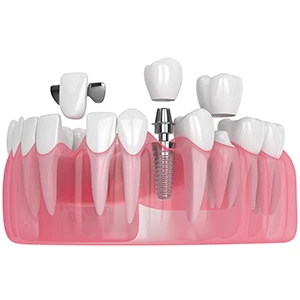The question of Dental Implants vs Dentures: Which is Better for You? is a crucial decision for those dealing with missing teeth. Missing teeth aren’t just a problem for your oral health; they can also affect your overall well-being and self-confidence. It’s important to note that missing teeth is common and nothing to be ashamed of, regardless of age.
Studies show that around 70% of adults aged 35 to 44 have lost at least one tooth, and by age 74, about 1 in 4 people are missing all of their natural teeth.
This common problem highlights the need for effective solutions. Fortunately, there are viable options available to restore both the look and function of your smile, such as dental implants and dentures.
Let’s delve into the question, “Dental Implants vs Dentures: Which is the Best Choice for You?”
Dentures are custom-made dental devices designed to replicate the look and function of natural teeth. Depending on the severity of tooth loss, our dentists may suggest either a full or partial denture. A partial denture is used when a person is missing only a few teeth, while a full denture replaces all teeth.
We offer various denture options tailored to your specific needs, including instant, conventional, full, and partial dentures.
Dentures sit on your gums and should be taken out before bedtime to give your gums a chance to rest and heal. When you’re not wearing them, it’s crucial to keep your dentures moist in water or a denture cleaning solution. This helps prevent them from drying out, cracking, or losing their shape.

Dental implants are titanium-made artificial tooth roots that are surgically inserted into your jawbone to support a crown. They look like your natural teeth in appearance and function.
Unlike dentures, dental implants provide stability, so you can eat confidently without concerns about them shifting. Maintaining dental implants by brushing and flossing your teeth twice daily is crucial, just as you would with natural teeth.
Before deciding, it’s essential to determine if you require either dental treatment.
Missing teeth affects your confidence and impacts your overall health. When gaps from missing teeth expose your gums, they create spaces where food particles and bacteria can accumulate. If left unclean, these particles and bacteria can cause infections, leading to gum disease, which causes health issues like heart disease and diabetes.
Beyond oral health, missing teeth can also affect your jaw structure. Surrounding teeth shift to fill the gaps and cause dental issues like tooth decay and potential tooth loss.
Considering these factors, choosing the appropriate tooth replacement option for your specific dental needs is vital. But how do you decide whether Dental Implants or Dentures are better for you?
While dentures offer a more cost-effective solution compared to dental implants, they do not address the issue of jawbone deterioration. When a tooth is missing, your body starts absorbing minerals from the jawbone, leading to its weakening and deterioration in the area where the tooth root once existed.
Adjacent teeth may also shift toward the gap, potentially causing changes in facial structure and making denture wear uncomfortable. It’s crucial to consult with dentists to know if you can have dental implant surgery, which can help prevent tooth loss and jawbone weakening.
We strongly recommend dental implants whenever possible to help patients avoid long-term health complications related to missing teeth.
Dentures have served as a popular choice for replacing missing teeth for centuries. Modern dentures now offer enhanced comfort, a natural appearance, and restored functionality for eating and speaking.
One notable advantage of dentures over dental implants is their affordability. Because dentures don’t involve surgical procedures like implants, they tend to be more budget-friendly. Despite being custom-made for a precise fit and appearance, the process of fitting dentures is less complex and invasive compared to undergoing dental implant surgery.
Dentures are often preferred when a patient is not fit for dental implant surgery due to various reasons, such as medical conditions or jawbone health. Factors like jaw strength and bone density play significant roles in the success of dental implant procedures. While bone grafts may be an option for some patients, dental implants aren’t suitable for everyone.
For individuals who have lost most or all of their teeth, dentures offer an effective solution by restoring a natural-looking smile and improving eating and speaking abilities. They provide a quicker and more cost-effective option compared to dental implants.
Dental implants are a great option when you need a permanent solution for missing teeth. They work by placing titanium posts into your jawbone, which then support dental crowns, bridges, or full arch replacements. The best part? They can last a lifetime, unlike artificial teeth that may need replacing over time.
Compared to dentures, dental implants offer some clear advantages. They’re fixed in place like your natural teeth, so you won’t have to worry about them moving around. This stability makes eating and speaking easier and gives you a more natural feeling. Plus, they’re designed to look just like real teeth, so you can smile confidently, knowing they blend right in.
| Feature | Dental Implants | Dentures |
| Durability | Last a lifetime with proper care | Last 5-10 years |
| Stability | Firmly fixed in the jawbone | Rest on the gums; less stable |
| Maintenance | Easy to clean like natural teeth | Require removal for cleaning |
| Cost | Higher initial cost | Lower initial cost |
| Bone Health | Prevents bone loss in the jawbone | Does not prevent bone loss |
| Eating & Speaking | Excellent chewing & speech ability | It may affect eating & speech initially |
| Aesthetics | Natural-looking appearance | Appearance may vary |
| Comfort | Very comfortable once integrated | It may cause gum irritation initially |
| Adjunct Procedures | Requires surgery for placement | Non-surgical process |
When it comes to comparing dental implants vs dentures, there isn’t a one-size-fits-all solution. Each option comes with its own advantages and drawbacks, depending on your unique needs and preferences. Dental implants excel in long-term durability and stability, closely resembling natural teeth, whereas dentures offer a more cost-effective and less invasive alternative. It’s essential to consult with a skilled dentist to assess which option aligns best with your oral health objectives and lifestyle.
Schedule a consultation with Clarksburg Dental Center in Germantown, MD, today! New patients can call us at (301) 245-2217, and all other callers can reach us at (301) 515-5525. Book your appointment online for personalized dental care tailored to your needs.
Dental implants usually cost more upfront because they involve surgery. However, they can be a better long-term investment because they last longer and offer more stability than dentures.
Dental implants can last a lifetime if you take good care of them, while dentures typically need to be replaced every 5 to 10 years.
Dentures are a great option if you’re missing several teeth or need a complete set. They’re removable and can restore your ability to eat and speak comfortably.




















Use keywords in the search box below to find what you're looking for.
